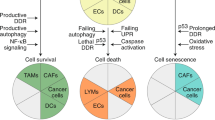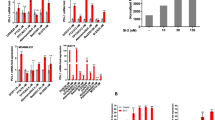Abstract
Scatter factor (SF) (hepatocyte growth factor) is a cytokine that may play a role in human breast cancer invasiveness and angiogenesis. We now report that SF can block the induction of apoptosis by various DNA damaging-agents, including cytotoxic agents used in breast cancer therapy. SF protected MDA-MB-453 human breast cancer cells, EMT6 mouse mammary tumor cells and MDCK renal epithelial cells against apoptosis induced by adriamycin (ADR), X-rays, ultraviolet radiation, and other agents. Protection was observed in assays of DNA fragmentation, cell viability (MTT), and clonogenic survival. Protection of MDA-MB-453 cells against ADR was dose- and time-dependent; maximal protection required pre-incubation with 75–100 ng/ml of SF for 48 h or more. Protection required functional SF receptor (c-Met), but was not dependent on p53. Western blotting analysis revealed that pre-treatment of MDA-MB-453 cells with SF inhibited the ADR-induced decreases in the levels of Bcl-XL, an anti-apoptotic protein related to Bcl-2; and the dose-response and time course characteristics for SF-mediated increases in the Bcl-XL protein levels of ADR-treated cells were consistent with the degrees of protection against apoptosis observed under the same conditions. Furthermore, Bcl-XL levels were not down-regulated by ADR in MDA-MB-231 breast cancer cells, consistent with the finding that SF failed to protect these cells against ADR, despite the fact that they contain functional c-Met receptor. In contrast to Bcl-XL, SF blocked ADR-induced increases in c-Myc and inhibited the expression of p21WAF1/CIP1 and of the BRCA1 protein in MDA-MB-453 cells. However, SF did not cause significant changes in the cell cycle distribution of ADR-treated cells. These findings suggest that SF-mediated protection of human breast cancer cells may involve inhibition of one or more pathways required for the activation of apoptosis and may particularly target the anti-apoptotic mitochondrial membrane pore-forming protein Bcl-XL as a component of the protective mechanism. By implication, the accumulation of SF within human breast cancers may contribute to the development of a radio- or chemoresistant phenotype.
This is a preview of subscription content, access via your institution
Access options
Subscribe to this journal
Receive 50 print issues and online access
$259.00 per year
only $5.18 per issue
Buy this article
- Purchase on Springer Link
- Instant access to full article PDF
Prices may be subject to local taxes which are calculated during checkout
Similar content being viewed by others
Author information
Authors and Affiliations
Rights and permissions
About this article
Cite this article
Fan, S., Wang, JA., Yuan, RQ. et al. Scatter factor protects epithelial and carcinoma cells against apoptosis induced by DNA-damaging agents. Oncogene 17, 131–141 (1998). https://doi.org/10.1038/sj.onc.1201943
Received:
Revised:
Accepted:
Published:
Issue Date:
DOI: https://doi.org/10.1038/sj.onc.1201943
Keywords
This article is cited by
-
A DNA-PK phosphorylation site on MET regulates its signaling interface with the DNA damage response
Oncogene (2023)
-
An oncogene addiction phosphorylation signature and its derived scores inform tumor responsiveness to targeted therapies
Cellular and Molecular Life Sciences (2023)
-
The role of MET in chemotherapy resistance
Oncogene (2021)
-
Aggregation of lipid rafts activates c-met and c-Src in non-small cell lung cancer cells
BMC Cancer (2018)
-
The clinical and functional significance of c-Met in breast cancer: a review
Breast Cancer Research (2015)



